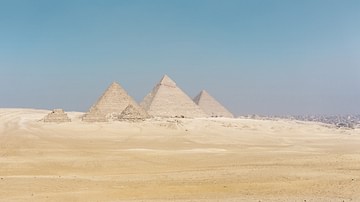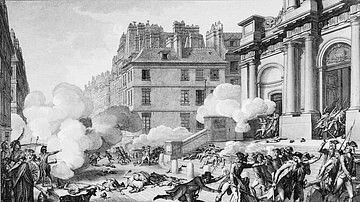Search
Did you mean: Muse?
Search Results

Definition
Patrician
The 4th century BCE Greek philosopher Aristotle once wrote in his essay Politics, “If liberty and equality…are chiefly to be found in democracy, they will be best attained when all persons alike share in the government to the utmost.” Regrettably...

Definition
Pyramid
A pyramid is a structure or monument, usually with a quadrilateral base, which rises to a triangular point. In the popular imagination, pyramids are the three lonely structures on the Giza plateau at the edge of the Sahara Desert but there...

Definition
Persepolis
Persepolis was the capital of the Persian Achaemenid Empire from the reign of Darius I (the Great, r. 522-486 BCE) until its destruction in 330 BCE. Its name comes from the Greek Perses-polis (Persian City), but the Persians knew it as Parsa...

Definition
Ancient Syria
Syria is a country located in the Middle East on the shore of the Mediterranean Sea and bordered, from the north down to the west, by Turkey, Iraq, Jordan, Israel, and Lebanon. It is one of the oldest inhabited regions in the world with archaeological...

Definition
Ur-Nammu - Founder of the Sumerian Renaissance
Ur-Nammu (c. 2112-c. 2094) was the founder of the Third Dynasty of Ur in Sumer who initiated the so-called Ur III Period (c. 2112-c.2004 BCE) also known as the Sumerian Renaissance. He is best known as the king who composed the oldest extant...

Definition
Compromise of 1850
The Compromise of 1850 was a series of five bills passed by the US Congress in September 1850 to diffuse a sectional crisis brewing between the 'free states' of the North and the 'slave states' of the South. The crisis was sparked by a disagreement...

Definition
Avars
The Avars were a confederation of heterogeneous (diverse or varied) people consisting of Rouran, Hephthalites, and Turkic-Oghuric races who migrated to the region of the Pontic Grass Steppe (an area corresponding to modern-day Ukraine, Russia...

Definition
Ghosts in the Ancient World
A belief in an afterlife was central to every major civilization of the ancient world and this encouraged the recognition of the reality of ghosts as the spirits of the departed who, for one reason or another, either returned from the realm...

Definition
Thomas Malory
Sir Thomas Malory (c. 1415-1471 CE) was an English knight during the War of the Roses (1455-1487 CE) best known for his highly influential work of medieval literature, Le Morte D'Arthur regarded as the first novel in English, the first in...

Definition
13 Vendémiaire
The Revolt of 13 Vendémiaire Year IV (5 October 1795) was a royalist uprising in Paris during the French Revolution (1789-1799). In response to the anti-royalist policies of the Thermidorian Reaction, 25,000 Parisians rose in revolt but were...